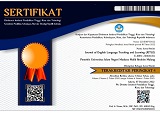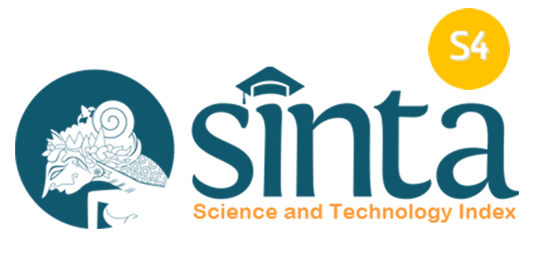Exploring the implementation of Whatsapp-assisted language learning of primary school in rural area
Abstract
Full Text:
PDFReferences
Brown, H. D. (2007). Teaching by principles: An interactive approach to language pedagogy. Pearson Education.
Chen, C.-M., Hsu, S.-H., Li, Y.-L., & Peng, C.-J. (2006). Personalized intelligent m- learning system for supporting effective English learning. IEEE International Conference on Systems, Man and Cybernetics, 4898–4903. https://doi.org/10.1109/ICSMC.2006.385081
Duman, G., Orhon, G., & Gedik, N. (2015). Research trends in mobile assisted language learning from 2000 to 2012. ReCALL, 27(2), 197–216. https://doi.org/10.1017/S0958344014000287
Hall, A. (2007). Vygotsky goes online: Learning Design from a socio-cultural perspective. Learning and Socio-Cultural Theory: Exploring Modern Vygotskian Perspectives International Workshop 2007, 1(1), 94–107.
Hoven, D., & Palalas, A. (2016). Ecological constructivism as a new learning theory for MALL: An open system of beliefs, observations, and informed explanations. The Internationnal Handbook of Mobile-Assisted Language Learning, 113–137.
Johnson, K. E. (2006). The sociocultural turn and its challenges for second language teacher education. TESOL Quarterly, 40(1), 235. https://doi.org/10.2307/40264518
Lantolf, J. P., Poehner, M. E., & Swain, M. (Eds.). (2018). The Routledge handbook of sociocultural theory and second language development (1st ed.). Routledge. https://doi.org/10.4324/9781315624747
Liu, J. (1999). Nonnative-English-speaking professionals in TESOL. TESOL Quarterly, 33(1), 85–102. https://doi.org/10.2307/3588192
Manan, N. A. (2017). Whatsapp mobile tool in second language learning. Indonesian EFL Journal, 3(1), 87. https://doi.org/10.25134/ieflj.v3i1.657
Mwakapina, J., Mhandeni, A. S., & Nyinondi, O. (2016). WhatsApp mobile tool in
second language learning: Opportunities, potentials and challenges in higher education settings in Tanzania. International Journal of English Language Education, 4, 70. https://doi.org/10.5296/ijele.v4i2.9711
Ramamuruthy, V., & Rao, S. (2015). Smartphones promote autonomous learning in ESL classrooms. Malaysian Online Journal of Educational Technology, 3(4), 23–35.
Samaie, M., Mansouri Nejad, A., & Qaracholloo, M. (2018). An inquiry into the efficiency of WhatsApp for self- and peer-assessments of oral language proficiency: An inquiry into the efficiency of WhatsApp. British Journal of Educational Technology, 49(1), 111–126. https://doi.org/10.1111/bjet.12519
Thornton, P., & Houser, C. (2005). Using mobile phones in English education in Japan: Using mobile phones in English education in Japan. Journal of Computer Assisted Learning, 21(3), 217–228. https://doi.org/10.1111/j.1365- 2729.2005.00129.x
Yudhiantara, R. A., Hasanah, A., & Ruswandi, U. (2017). WhatsApp goes to campus— Promoting mobile assisted language learning (MALL) in Islamic higher education: 2nd International Conference on Sociology Education, 477– 480.https://doi.org/10.5220/0007100504770480
Zhang, D., Fan, Y., & Du, W. (2013). Sociocultural theory applied to second language learning: Collaborative learning with reference to the Chinese context. International Education Studies, 6(9), p165. https://doi.org/10.5539/ies.v6n9p165
DOI: https://doi.org/10.18860/jetle.v4i1.17688
Refbacks
- There are currently no refbacks.
Jalan Gajayana 50 Malang 65144, Jawa Timur, Indonesia

This work is licensed under a Creative Commons Attribution-ShareAlike 4.0 International License.
Indexed by





